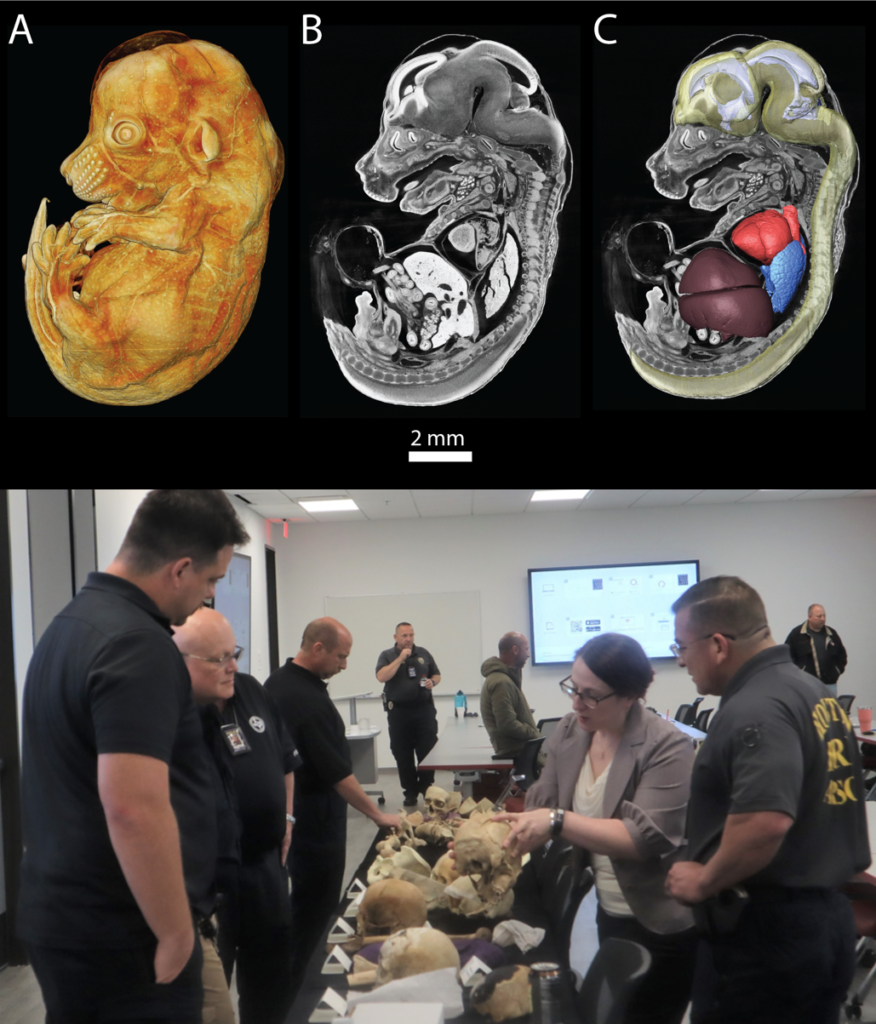Kate Lesciotto
Kate M. Lesciotto, PhD, JD, DBFA
Assistant Professor
Center for Anatomical Sciences
Graduate School of Biomedical Sciences
University of North Texas Health Science Center
Ft. Worth, TX 76107
Kate.Lesciotto@unthsc.edu
ABFA Board-Certified Forensic Anthropologist (2023)
Ph.D. Anthropology, Pennsylvania State University (2020).
M.S. Forensic and Biological Anthropology, Mercyhurst University (2015).
J.D. Law, Washington University in St. Louis (2009).
B.S. Biological Science and Zoology, Colorado State University (2004).
Research
 Dr. Lesciotto’s research spans three areas: anatomy education, craniofacial growth and development, and forensic anthropology. Alongside colleagues at multiple institutions, Dr. Lesciotto has investigated the impact of the Covid-19 pandemic on anatomy education and how educators handled the shift of a traditionally hands-on, three-dimensional learning environment in a dissection lab to two-dimensional online modalities. This project has expanded to explore how adaptations to learning during Covid-19 may have fundamentally altered pedagogical philosophies within anatomy and medical education. Dr. Lesciotto’s research on craniofacial growth focuses on pre- and perinatal interactions between the developing brain and skull using mice as a model organism. Through this work, she investigates hypotheses related to how encephalization may have influenced craniofacial morphology over the course of hominin evolution. Finally, Dr. Lesciotto is an active forensic anthropologist, combining casework and skeletal research to improve methods for estimating sex from skeletal remains. Her current projects focus on validating existing sex estimation methods, defining new osteological traits, and integrating morphological and metric skeletal traits using new statistical models.
Dr. Lesciotto’s research spans three areas: anatomy education, craniofacial growth and development, and forensic anthropology. Alongside colleagues at multiple institutions, Dr. Lesciotto has investigated the impact of the Covid-19 pandemic on anatomy education and how educators handled the shift of a traditionally hands-on, three-dimensional learning environment in a dissection lab to two-dimensional online modalities. This project has expanded to explore how adaptations to learning during Covid-19 may have fundamentally altered pedagogical philosophies within anatomy and medical education. Dr. Lesciotto’s research on craniofacial growth focuses on pre- and perinatal interactions between the developing brain and skull using mice as a model organism. Through this work, she investigates hypotheses related to how encephalization may have influenced craniofacial morphology over the course of hominin evolution. Finally, Dr. Lesciotto is an active forensic anthropologist, combining casework and skeletal research to improve methods for estimating sex from skeletal remains. Her current projects focus on validating existing sex estimation methods, defining new osteological traits, and integrating morphological and metric skeletal traits using new statistical models.
Selected Publications
- Lesciotto KM, Tomlinson L, Leonard S, Richtsmeier JT. Early View. Embryonic and early postnatal cranial bone volume and tissue mineral density values for C57BL/6J laboratory mice. Developmental Dynamics. DOI: 10.1002/dvdy.458.
- Bauler LD, Lesciotto KM, Lackey-Cornelison W. 2022. Factors impacting the rapid transition of anatomy curricula to an online environment in response to COVID-19. Anatomical Sciences Education 15(2):221-232. DOI: 10.1002/ase.2163
- Klales AR, Garvin H, Gocha T, Lesciotto KM, Walls M. 2021. Examining reliability of popular morphological sex estimation methods. Forensic Anthropology 3:139-150. DOI: 10.5744/fa.2020.4015
- Hinde K, Amorim CE, Brokaw AF, Burt N, Casillas M, Chen A, Chestnut T, Connors PK, Dasari M, Ditelberg CF, Dietrick J, Drew J, Durgavich L, Easterling B, Henning C, Hilborn A, Karlsson EK, Kissel M, Kobylecky J, Krell J, Lee DN, Lesciotto KM, Lewton KL, Light JE, Martin J, Muphy A, Nickley W, Nunez-de la Mora A, Pellicer O, Pellicer V, Perry AM, Schuttler SG, Stone AC, Tanis B, Weber J, Wilson M, Willcocks E, Anderson CN. 2021. March Mammal Madness and the Power of Narrative in Science Outreach. eLife 10:e65066. DOI: 10.7554/eLife.65066
- Lesciotto KM, Motch Perrine SM, Kawasaki M, Stecko T, Ryan TM, Kawasaki K, Richtsmeier JT. 2020. Phosphotungstic acid enhanced microCT: optimized protocols for embryonic and early postnatal mice. Developmental Dynamics 249(4):573-585. DOI: 10.1002/dvdy.136
- Richtsmeier JT and Lesciotto KM. 2020. From phenotype to genotype and back again. Bulletins et Mémoires de la Société d’Anthropologie de Paris 32:8-17. DOI: 10.3166/bmsap-2019-0065
- Lesciotto KM and Richtsmeier JT. 2019. Craniofacial skeletal responses to encephalization: How do we know what we think we know? American Journal of Physical Anthropology 168(S67):27-46. DOI: 10.1002/ajpa.23766
- Lesciotto KM and Doershuk LJ. 2018. Effect of age on nonmetric cranial traits in adults. Forensic Anthropology 1(3):150-159. DOI 10.5744/fa.2018.0016
- Lesciotto KM and Doershuk LJ. 2018. Accuracy and reliability of the Klales et al. (2012) morphoscopic pelvic sexing method. Journal of Forensic Sciences 63(1):214-220. DOI: 10.1111/1556-4029.13501
- Lesciotto KM, Heuzé Y, Jabs EW, Bernstein JM, and Richtsmeier JT. 2018. Choanal atresia and craniosynostosis: development and disease. Plastic and Reconstructive Surgery 141(1):156-168. DOI: 10.1097/PRS.0000000000003928
- Lesciotto KM, Cabo LL, Garvin HM. 2016. A morphometric analysis of prognathism and evaluation of the gnathic index in modern humans. HOMO – Journal of Comparative Human Biology 67(4):294-312. DOI: 10.1016/j.jchb.2016.04.006
- Lesciotto KM. 2015. The impact of Daubert on the admissibility of forensic anthropology expert testimony. Journal of Forensic Sciences 60(3):549-555. DOI: 10.1111/1556-4029.12740
- Lesciotto KM. 2008. KSR: Have gene patents been KO’D-the non-obviousness determination of patents claiming nucleotide sequences when the prior art has already disclosed the amino acid sequence. Washington University Law Review 86(1):209-240.
Teaching
At UNTHSC, Dr. Lesciotto serves as the course director for Structural Anatomy (PHAN 5301) for graduate students and also teaches gross anatomy courses for Medical, Physical Therapy, and Physician Assistant students.
Courses Taught
- PHAN 5301: Structural Anatomy (graduate students)– Course Director
- MEDE 7811: Musculoskeletal and Skin Systems 1 (medical students)
- MEDE 7812: Nervous System 1 (medical students)
- MEDE 7615: Cardiopulmonary System 1 (medical students)
- MEDE 7611: Gastrointestinal & Renal Systems 1 (medical students)
- MEDE 7715: Reproductive & Endocrine Systems 1 (medical students)
- DPHT 7200 & 7400: Clinical Anatomy 1 & 2 (physical therapy students)
- MPAS 5401 & 5208: Clinical Anatomy 1 & 2 (physician assistant students)


Social media